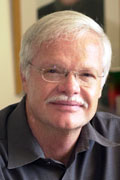Prof. Van Coller elected as member of ASSAF
 |
| Prof. Hennie van Coller |
|
After he had been nominated by Prof. Jonathan Jansen, Rector and Vice-Chancellor of the University of the Free State (UFS), Prof. Hennie van Coller, Head of the Department of Afrikaans and Dutch, German and French, was elected as a member of the Academy of Science of South Africa (ASSAF).
ASSAF consists of approximately 340 members and Prof. Van Coller is proud to be the only Afrikaans literator amongst the members. Apart from Prof. Dingie Janse van Rensburg, who retired earlier this year, Prof. Van Coller is also the only staff member of the UFS’s Faculty of the Humanities who is a member of ASSAF.
Prof. Van Coller is a former Chairperson of the South African Academy for Science and Art and states that his membership of ASSAF proves that a good relationship and collaboration exist amongst the academies for the benefit of science.
The academy’s core function requires that the country’s most outstanding academics be honoured as members. With that in mind, Prof. Van Coller’s research and contribution to Afrikaans literature were not in vain. “Recognition cannot be bought, and therefore recognition by one’s peers in particular is very precious,” said Prof. Van Coller.
– Lize du Plessis